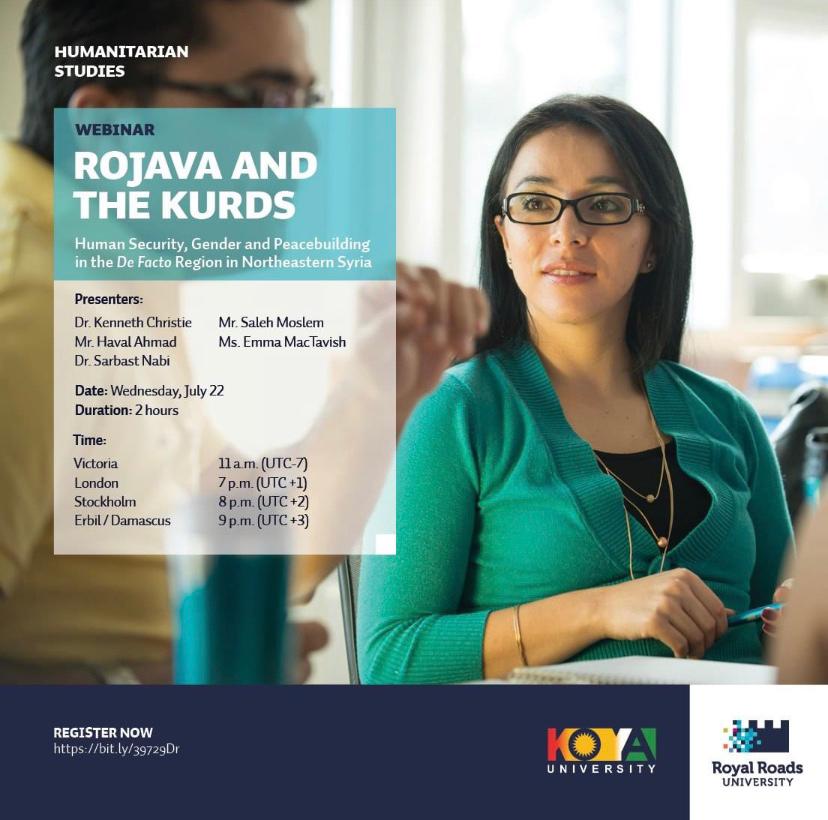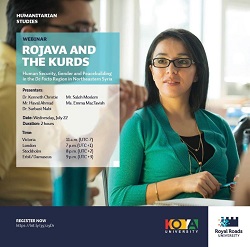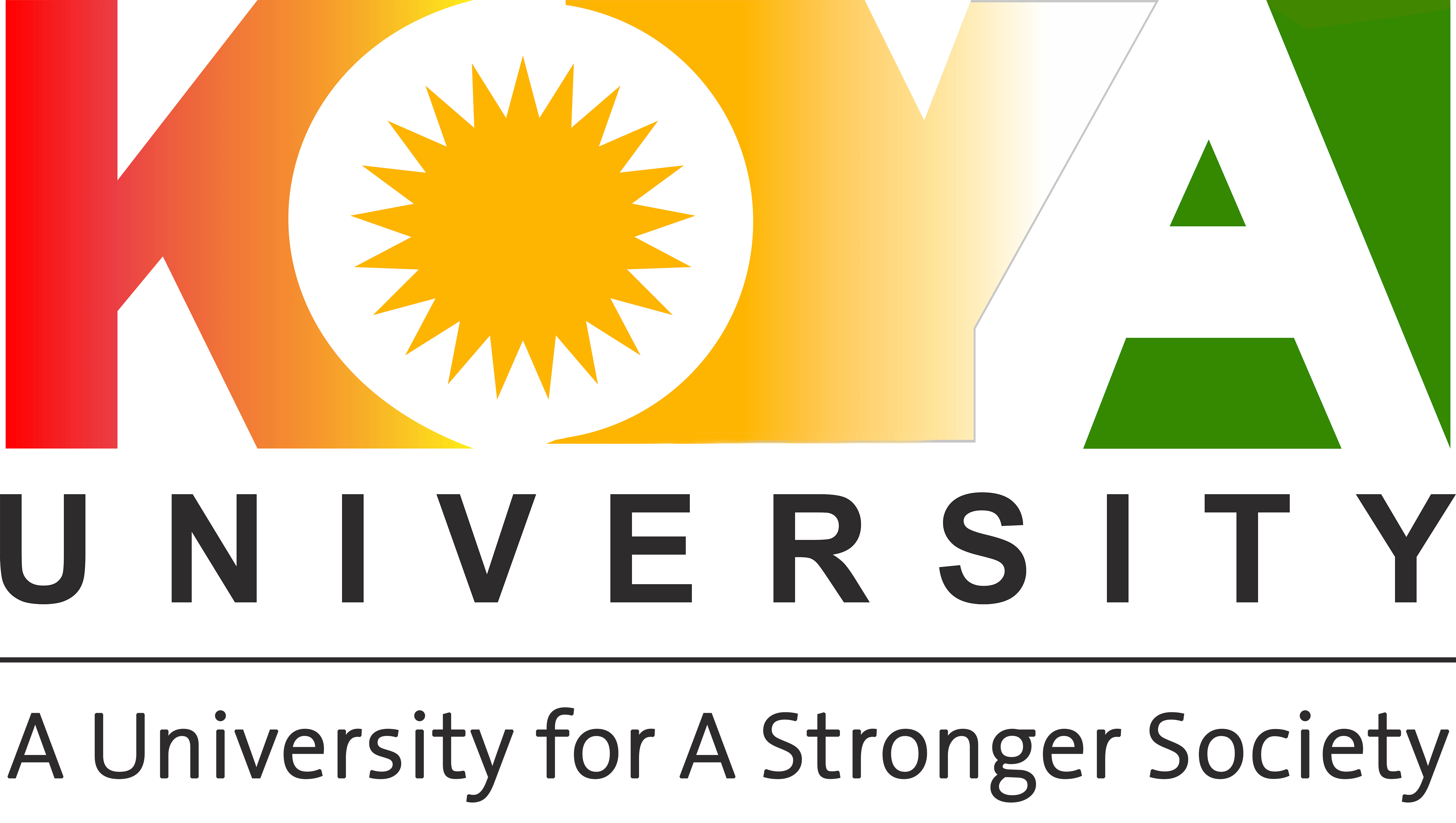Human Security and Peacebuilding responds to the increasing demand for leadership in humanitarian assistance, social reconstruction, conflict management and peacebuilding in international contexts. On July 22nd, join Dr. Kenneth Christie, Mr. Saleh Moslem, Mr. Haval Ahmad, Ms. Emma MacTavish, and Dr. Sarbast Nabi for a virtual workshop entitled: Rojava and the Kurds: Human security, gender and peacebuilding in the de facto region in Northeastern Syria. The workshop is organized by Koya University with Royal Roads University.
To register, please click here: http://bit.ly/39729Dr
With the rise, fall and resurgence of the Islamic State (ISIS), the vulnerable position of Kurds in Rojava, a region in Northeastern Syria, has become a highlighted media topic and has been placed at the centre of political debates in the Middle East, an area fraught with human security issues. In Rojava, the Kurdish-led Syrian Democratic Forces (SDF), a diverse group that has led the fight against extremism and ISIS. A unique aspect of the region, termed the “Rojava Experience” is the inclusion and active political participation of women.
The visibility of women in the community contributes to further gender equality in the area and has helped normalize female leadership. This role has been one of increasing stability, peacebuilding, and sustainability in post-conflict areas. Compared to other parts of Syria, the Rojava experience has been proven a successful governance model in the Middle East, especially with the feminist approach to administration of the region. This webinar is intended to inform and educate on the human security situation in Rojava and highlight the contribution of women in the area.
In addition, we address current obstacles to Rojava governance, particularly the interference by state and non-state actors. This includes the Turkish offensive into the region along with other proxies that are opposed to Kurdish-led autonomous governance. While Turkey refers to these operations as the “Peace Spring,” those in the immediate area have claimed that it is an ongoing ethnic cleansing and an attempt to force demographic changes. Behind many of these changes, we cannot ignore the role of the United States and its disastrous policies in the region. This webinar will bring in experts on human security, peacebuilding, and gender to discuss the implications for the people living there, the impacts on the feminist movement in the Kurdish region, and the threat of reigniting violent extremism as a result of the increasing vulnerability and de-stabilization of the region.
- Date: Wednesday, July 22, 2020
- Time: Erbil/Damascus 9:00-11:00 p.m.
This webinar is hosted in collaboration with Koya University
Meet the Presenters:
Dr. Kenneth Christie is the Program Head and a Professor in the Master of Arts in Human Security and Peacebuilding program at Royal Roads University. Christie is a political scientist, author, editor and international academic who has taught and conducted research at universities in the U.S., Singapore, South Africa, Norway and Dubai. Working all over the world has given him a unique perspective on peace, development and human security. His work has focused on issues of human rights, security and democratization.
Mr. Saleh Moslem is a familiar Kurdish political figure in the politics of NE Syria and he was one of the founders of PYD in 2003. He is a member of Co-Presidency Council of the party. Mr. Moslem is a frequent presence in European political institutions and has been invited and hosted by a number of officials in EU, including addressing the European Parliament.
Mr. Haval Ahmad is a Doctoral Candidate in International Politics at Aberystwyth University in Wales, an alumni of the Master of Arts in Human Security and Peacebuilding program and associate faculty within the School of Humanitarian Studies Royal Roads University. His work focuses on human security, counter violent extremism, and de/radicalization. His current research projects look into the deradicalization of children and youth in the post-ISIS era, while other projects include co-authoring research looking into human security in the de facto autonomous region of Rojava in NE Syria
Ms. Emma MacTavish is a PhD Candidate in Political Science and International Relations with the University of Birmingham in Birmingham, UK, and an alumni of the Master of Arts in Human Security and Peacebuilding program at Royal Roads University. Her academic focus has been on women in the Middle East and gender and conflict studies. She has researched issues affecting women in refugee camps and the effect of Kurdish feminism on stability in the Middle East.
Dr. Sarbast Nabi, Kurdish-Syrian academic taught in a number of Syrian universities until he was banned by the Assad regime because of political activism. He then moved to the Iraqi Kurdistan region, teaching political philosophy at Koya University. He is a frequent contributor in Arab and Kurdish media that provides expert analysis on issues relating to Syria, Iraq, Turkey, Iran, and Kurdish affairs.

----------
Koya University (KOU) is located in the city of Koya (Koy Sanjaq) which is 1.0 hr drive to the East of the Kurdistan Region capital Erbil (Arbil, Hewlér) in Kurdistan Region of F.R. Iraq. It is on the foothills of beautiful high mountain. Its campus has been carefully laid out to embrace the beautiful mountainous nature. . There are 4 Faculties and 2 Schools in KOU; Faculty of Engineering (FENG), Faculty of Science and Health (FSCH), Faculty of Education (FEDU), Faculty of Humanities and Social Silences (FHSS), Shcool of Physical Education (SPHE) and School of Medicine (SMED). Also, there are two research centers; Genome Center and Malai Gawra Center. Moreover, at KOU there is an English Language Center (BELC) at KOU has been opened with the sponsorship of IREX and American embassy in Baghdad as well as with the support of Spring International Language Center of The University of Arkansas. KOU has two Scientific Journals; ARO-The Scientific Journal of Koya University, which is indexed by Clarivate Analytics (ESCI), and Koya University Journal of Humanities and Social Sciences (KUJHSS). KOU is a proactive member of Erasmus/ Marhaba Project and Erasmus+. KOU signed many Memorandum of Understandings (MoU) with many International Universities, e.g., The University of Arkansas (June 2015). The Lulea University in Sweden (April 2014), The University of Nottingham in the UK, The University of Buckingham in the UK (Oct 2008), Belkin University in Turkey (Sep 2009) and The University of Greenwich in the UK.

